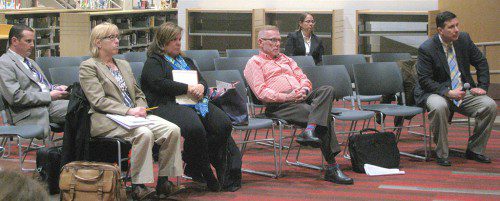Published in the April 6, 2017 edition.
By MARK SARDELLA
MELROSE – For the first time ever, the Wakefield School Committee and the Melrose School Committee met in joint session last night with the three legislators that represent both communities on Beacon Hill.
In the Learning Commons at Melrose High School, Sen. Jason Lewis, Rep. Paul Brodeur and Rep. Donald Wong exchanged ideas with Wakefield and Melrose school committee members and school administrators on a variety of issues ranging from the Fiscal 2018 state budget and Chapter 70 funding to school accountability under the federal Every Student Succeeds Act.
Calling the Education Reform Act of 1993 “a grand bargain” to achieve equity in education through increased state funding in exchange for greater school district accountability, Lewis maintained that there was a growing sense in the state “that we may need another grand bargain” to address the changing needs of schools and students.
He asserted that the 2008-2009 recession coupled with tax cuts had left schools struggling again and had widened the the gap between more affluent and poorer districts. He insisted that it has become clear that expanding charter schools isn’t the answer, but expressed confidence that an understanding is forming that issues around the Chapter 70 formula and the Foundation Budget Review Commission need to be addressed.
He predicted that FY 2018 would be one of the toughest for the state budget in some time. He said that the current economic recovery has not been robust and the state has not seen much revenue growth. He partly blamed decreasing sales tax revenues as a result of increased online sales and the move to an increasingly service-based economy.
Brodeur noted that law requires the state budget to be balanced. He said that there has been significant pushback from the business community in response to Gov. Charlie Baker’s proposal to increase assessments on businesses.
He said that while a 2 percent overall increase in Chapter 70 funding is nice, what’s more important is what flows to the communities of Wakefield and Melrose. He maintained that Wakefield may be doing better now with respect to Chapter 70, but observed that the town had started from a worse position than Melrose.
He said that charter school reimbursements to local districts have been underfunded of late and legislators are hoping to get that funding back up to 100 percent.
Brodeur said that he was excited that Wakefield was moving toward addressing the deficiencies at Wakefield Memorial High School. But he noted that Massachusetts School Building Authority funding is closely tied to sales tax revenue which has been flat.
Lewis talked about the so called “millionaires tax” as a potential source of increased state aid to education. He said that the proposed tax, expected to be on the 2018 state election ballot, would bring in about $2 billion a year.
But Wong pointed out that language guaranteeing that the funds from the millionaires’ tax would be earmarked for education and transportation was removed from the proposal. Wong said that he would only support the tax if that language were put back in.
Melrose School Committee member Edward O’Connell agreed that “something dramatic” akin to the 1993 Education Reform Act was needed again. But he wondered where the money would come from.
Lewis reiterated that the millionaires’ tax offered the most promise for increasing state funding to schools.
Regarding state measures of school district accountability, Lewis said that he was receptive to criticism that the Department of Elementary and Secondary Education should take more time developing accountability measures and do more to incorporate arts and social and emotional learning into those measures.
Both Melrose Superintendent Cindy Taymore and Wakefield Superintendent Dr. Kim Smith expressed concern about what form those measures would take.
Smith said that she could certainly see the value of measuring student social and emotional well-being and access to the arts, but shared Taymore’s concern over what form those measures would take and how they would impact the way schools districts are assessed by the state.
Brodeur said that while the results that districts like Melrose and Wakefield put out is exceptional, he wanted to see more recognition of socio-economic differences among communities in those measures of school district accountability.
Wong pointed to the difficulty of comparing communities in terms of educational performance when so many have bi-lingual challenges that can affect which students pass standardized tests, which in turn impacts measurements of teacher performance.
Taymore said that Melrose was losing $90,000 due to a change in the way the state is counting the student population eligible for free and reduced-price lunch. Brodeur and Lewis talked about efforts address the immediate ramifications of those changes but were unsure of what form a long term solution would take.
Wong said that this was another area where language barriers and pride could play a role in what disadvantaged families are willing to report in terms of income, need and participation in assistance programs that the state uses to determine eligibility for free and reduced-price lunch.
Brodeur expressed concern over the ramifications that coming federal policies could have on education. He asked the local officials to keep the legislators informed with respect to any impact that they see.





